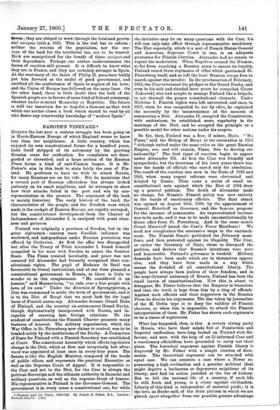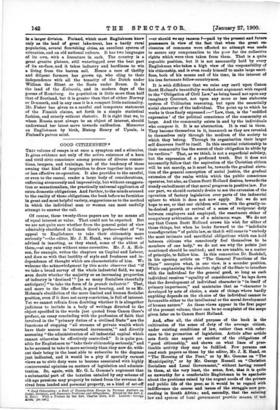NABOTH'S VINEYARD.*
DURING the last year a curious struggle has been going on in North-Eastern Europe of which England seems to know less than her neighbours. A little country, which has enjoyed its own constitutional forms for a hundred years, finds itself stripped of its autonomy by the growing Russian craze for unification. Its complaints are disre- garded or travestied, and a large section of the Russian Press forms a kind of anti-Finnish league. It is Mr. Fisher's aim in this book to state fairly the case of Fin- land. He professes to have no wish to attack Russia, for many Russians are on his side. But he maintains that a certain part of Russian officialdom has always looked jealously on its small neighbour, and he attempts to show how their attacks failed in the past and win by mis- representation in the present. The argument of the book is mainly historicaL The early history of the land, the characteristics of the people, and the Swedish ware which made it the cockpit of Eastern Europe, are rapidly surveyed; but the constitutional development from the Charter of Independence of Alexander I. is analysed with great clear- ness and patience.
Finland was originally a province of Sweden, but in the great eighteenth - century wars Swedish influence was weakened, and independence under Russian protection was offered by Catherine. At first the offer was disregarded but after the Treaty of Tilsit Alexander L found himself compelled in his wars with Sweden to annex the frontier State. The Finns resisted heroically, and peace was not restored till Alexander had formally recognised their con- stitutional rights. The pupil of Madame de Steel was favourable to liberal institutions, and at one time planned a constitutional government in Russia, so there is little to wonder at in this complaisance. " He considered it an honour," said Mannerheim, ." to rule over a free people with laws of its own." Under the direction of Sprengtporten, a Diet was summoned to settle the term of government, and it is to the Diet of Borga that we must look for the legal basis of Finnish autonomy. Alexander became Grand Duke of Finland, and the country an autonomous Grand Duchy, though diplomatically incorporated with Russia, and in- capable of entering into foreign relations. To the student of constitutions the Finnish Charter presents many features of interest. The military organisation, which the War Office in St. Petersburg now claims to control, was to be treated solely by the institutions of the Duchy. A Committee of State for Finland with a Finnish Secretary was established at Court. The constituent Assembly which effects legislative change is the Diet, which at first met irregularly, but after- ward was appointed at least once in every four years. The Senate is like the English Ministry, composed of the heads of public offices, and represents the practical Executive as well as the Supreme Court of Appeal. It is responsible to the Czar and not to the Diet, for the Czar is always the political Sovereign and the ultimate authority in financial and military questions, as well as the supreme fount of honour. His representative in Finland is the Governor-General. The government is in every sense a constitutional one, for while
• Finland and the Tsars, 1809-1899. By Joseph R. Fisher, B.A. London: Edward Arnold. [128.]
the initiative may lie on many questions with the Czar, his will can only take effect through representative machinery. The Diet especially, which is a sort of French States-General and American Supreme Court in one, is an adequate guarantee for Finnish liberties. Alexander had no reason to repent his moderation. When Napoleon crossed the Niemen, so far from requiring a Russian army to ensure its loyalty, Finland raised three regiments of rifles which garrisoned St. Petersburg itself, and so left the local Russian troops free to march against the invader. In the proclamation of February, 181G, the Czar reiterated his pledges to the Grand Duchy, and even in his sick and clouded later years he compelled Count Zakrevski, who had sought to manage Finland like a brigade, to act through the proper constitutional channels. Under Nicholas L Finnish rights were left untouched, and once, in 1827, when he was compelled to act by edict, he explained the necessity by the inconvenience at the moment of summoning a Diet. Alexander II. accepted the Constitution, with enthusiasm, he established some regularity in the meetings of the Diet, and be accepted the principle as a possible model for other nations under his sceptre.
So far, then, Finland was a free, if minor, State. " We Finns," said the Bishop of Borg& at the coronation in 1856 "although united under the same ruler as the great Russian Empire, are, and will remain, Finns, free to develop our nationality." The first signs of reaction begin to appear under Alexander III. At first the Czar was friendly and sympathetic, but the terrorism of his later years threw him into the hands of officials who care d only for absolutism. The result of the reaction was seen in the Diets of 1885 and 1888, when many urgent reforms were obstructed and delayed by Russia. Then came a series of small un- constitutional acts against which the Diet of 1894 drew up a general petition. The death of Alexander made no change, for Russia's Finnish policy was now entirely
in the hands of reactionary officials. The final attack was opened on August 30th, 1899, by the appointment of General Bobrikoff as Governor, and the famous proposal for the increase of armaments. An unprecedented increase was to be made, and it was to be made unconstitutionally by direct edict from St. Petersburg. And in the same month Count Muravieff issued the Czar's Peace Manifesto 1 We need not recapitulate the successive steps in the encroach- ment. The Finnish Senate published the February mani• festo, and then protested against its illegality The Czar, or rather the Secretary of State, chose to disregard the petition, and declare that Russia's intentions were pure and honourable. Finland's grievance is twofold. Military demands have been made which are in themselves oppres- sive, and they have been made in a way which means the downfall of all constitutional liberty. The people have always been jealous of their freedom, and in the semi-Oriental autocracy of Russia, Finland has been the small leaven of constitutionalism. Now this is about to disappear, Mr. Fisher believes that the Emperor is blameless and that the truth is kept from him by a ring of officials. Against such officials and their supporters in the Russian Press he directs his arguments. The line taken by journalists of the M. Ordin type is to deny the validity of Finnish charters, or when this is impossible, to attack the Finnish interpretation of them. Mr. Fisher has shown such arguments to be a tissue of sophistries.
What has happened, then, is this. A certain strong party in Russia, who have their minds full of Panslavism and Imperial unification, have long looked on Finland with dis- favour, and now, with the help of an ill-informed Czar and a reactionary officialdom, have proceeded to carry out their plans. The historical argument against Finnish liberty is disproved by Mr. Fisher with a simple citation of docu- ments. The theoretical argument can be attacked with equal ease. We can conceive a case where a Power re- presenting a high civilisation and a genuine political ideal might deprive a barbarous or degenerate neighbour of its liberty, and find its action justified at the bar of history. But to kill the national life of a country, if such life be still fresh and young, is a crime against civilisation. Liberty of this kind is independent of material profit ; it is the love, as Burke said, of the little platoon in which we are placed, apart altogether from our possible greater advantage
in a larger division. Finland, which most Englishmen know only as the land of great lake-trout, has a hardy rural population, several flourishing cities, an excellent system of education, and an old national culture. It has two languages of its own, with a literature in each. The country is a great granite plateau, still waterlogged over the best part of its surface, and it takes industry and hardiness to win a living from the barren soil. Hence a race of thrifty and diligent farmers has grown up, who cling to their independence with all the tenacity of the Dutch under William the Silent or the Scots under Bruce. It is the land of the Katetea/a, and in modern days of the poems of Runeberg. Its populati on is little more than half that of Scotland, but it is greater than that of either Norway or Denmark, and in any case it is a compact little nationality. Mr. Fisher has given us a careful and temperate statement of the Finnish claims, set forth in a simple statistical fashion, and utterly without rhetoric. It is right that we, to whom Russia must always be an object of interest, should understand her latest move towards unification. Moreover an Englishman by birth, Bishop Henry of Upsala, is Finland's patron saint.



















































 Previous page
Previous page